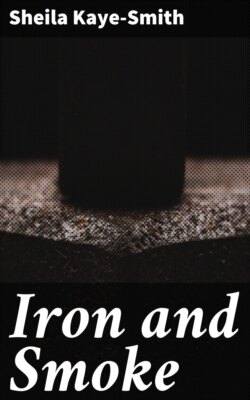Читать книгу Iron and Smoke - Sheila Kaye-Smith - Страница 4
На сайте Литреса книга снята с продажи.
§1
ОглавлениеTable of Contents
It would rain tomorrow, for the sky was green and watery at the rims. At the zenith a few stars pricked a purple darkness, bloomy as a grape, but where the sky was on the hills and in the distances of Cleveland, were lakes and pools and rivers of delicate tranquil green, rimmed with golden shores of cloud.
Jenny Bastow, standing on the terrace of Slapewath Grange, looked dreamily at the sky, and duly noted the threat of rain, with a faint apprehension in her heart. If it rained tomorrow, then the picnic to Thirkleby could not take place—there would be no driving up into the Moors in the family wagonette, to where the servants’ trap would have gone beforehand with salmon and game pie and other delicacies of a Bastow picnic. There would be no wearing of her new dark-green coat and skirt, with the jaunty green hat, in which she had planned yet a deeper entrance of Humphrey Mallard’s heart. He had seen her in her brown tweeds, so daringly short—quite six inches off the ground; and he had seen her in her various house-frocks of silk and foulard, with trimming of guipure lace, and braid and coloured silks .... but he had not seen her in the green coat and skirt in which she knew her hair looked more golden and her waist more trim than in anything else; and the day after tomorrow he would be gone. Tomorrow was the Last Day.
Her heart began to beat suffocatingly. She found her thoughts leading her into terrifying rapids of emotion. Would he speak before he went? Would he?—Oh, would he? She felt she could not bear the suspense if he did not, the dragging emptiness of the long weeks that must go by before in any decency he could be asked again. And yet had she any right to expect him to speak after so short an acquaintance? Only a fortnight ... or perhaps you could call it a month if you counted that brief first meeting at the Dilworths’ ball in London. Anyhow it was too short a time to expect ... but his looks, his manner, even sometimes the things he said, had been so very particular, and her family seemed to think—her mother had hinted ... oh, it must happen—it must....
She bowed her head to her arms that were folded on the balustrade. The first moonlight was upon her, and her long white dress trailed out behind her on the grass. Drooping there she was like a pale symbolic figure of moonlight and romance, suggesting fountains and sculptured nymphs and the moon shining on some white façade ... she brought all these things into the mind of Humphrey Mallard as he came towards her from the house.
“Jenny!”
She started upright, and the nymphs and fountains vanished to give place to a pretty, innocent, rather too artless girl of nineteen, wearing a while silk evening gown, with timid neck, and bold ballooning sleeves.
“You said I might call you that,” he continued, coming close to her.
“Yes, of course.”
The words seemed to catch her breath in a queer, awkward way so that she could say none of the things that she felt the occasion demanded, but allowed an unnerving silence to come and grow.
He leaned beside her on the balustrade, his elbow scarcely more than an inch from hers. The nymphs and fountains had come back into his imagination with the silence and the big white moon that had now entirely lifted herself above the arabesque of the hills. The silence seemed to be part of the moonlight ... it seemed part of his dream of a temple-like house with shimmering white façade—fluted pillars supporting a huge three cornered architrave, and on the lawn before it the freckled pool of a fountain where a naked nymph stood pouring water from a shell. He fearfully broke this silence and the dream of the white house.
“Jenny.”
She turned her face towards him in relief. The last few moments had been unendurable to her in their embarrassment. He saw her eyes look out sweetly and wonderingly from under the pale frizz of hair on her forehead, while her bosom heaved the laces of her gown. He trampled on his dreams and kissed her.
“Oh! ...”
The start, the quiver of her under his lips, told him if he had wanted any telling that he was the first who had ever been so bold. But though startled she was not dismayed. Her recoil was no more than the natural recoil of surprised innocence. He kissed her again, and there was none, only a fresh and sweet delight. He was touched by her yielding. His heart woke—he seemed to clasp his nymph.
“Jenny—darling little Jenny. I love you.”
As he spoke the moonlight suddenly changed, going up in a sheet of flame. The night turned crimson, and for a moment Humphrey felt his heart bound with fear, but the next he remembered the blast furnaces at Carlingrove. This was not the first time that he had seen them belch into the night, wiping out moon and stars, transforming the peaceful fields of Eden-in-Cleveland into some landscape of fire and horror, a frontier-stretch of hell.
“Oh!”
They both laughed together at his moment’s panic. Then he stooped to kiss her again. But the spell was broken. She had had time to think, to be afraid of her joy. A great shyness overwhelmed her, and she shrank out of his arms.
“I—I—I’m sorry. I mean I must go in. That is to say—I mean I promised Mother—”
He let her go. He would not alarm her by any violence in his courtship. Besides for him too the spell was broken, and he no longer clasped his nymph.
